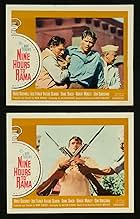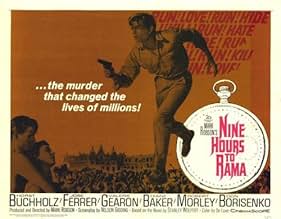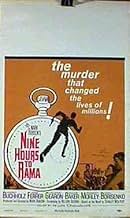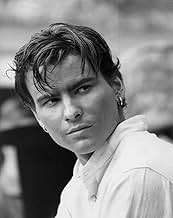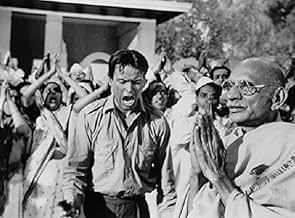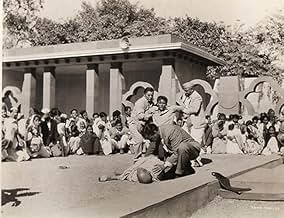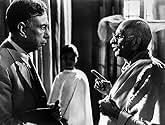Fictional narrative of Hindu militant activist Nathuram Godse's plan to kill Mahatma Gandhi and of police officer Gopal Das' task to find the killer before it's too late.Fictional narrative of Hindu militant activist Nathuram Godse's plan to kill Mahatma Gandhi and of police officer Gopal Das' task to find the killer before it's too late.Fictional narrative of Hindu militant activist Nathuram Godse's plan to kill Mahatma Gandhi and of police officer Gopal Das' task to find the killer before it's too late.
- Nominated for 1 BAFTA Award
- 1 nomination total
Paidi Jairaj
- G.D. Birla
- (as Jairaj)
Achala Sachdev
- Mother
- (as Achla Sachdev)
Nagendra Nath
- Magin Mehta
- (as Narendra Nath)
Bobby R. Naidoo
- Retiring Room Manager
- (as Bobby Naidoo)
- Director
- Writers
- All cast & crew
- Production, box office & more at IMDbPro
Featured reviews
I watched this film completely at random from my library of "old VHS" I thought it to be a very good production, but probably of marginal interest to today's public.
After I realized what the movie really portrayed, I was fascinated to pursue some of the other comments, a piece of history that has been "missed." Really some of this is very relevant to what is happening today. I very much appreciate the sentiments pro or con in the above reviews.
Good movie overall, I'll not comment on the production, but would make the following observations: Bucholz - great performance, but where did he go from here? (I did see the obit); Ferrer - very impressed with his handling of his role; Morley - miscast and not in character
Lastly. this was an AngloHollywood production of an IndoPakistani historic event. A Bollywood reproduction might prove interesting!
After I realized what the movie really portrayed, I was fascinated to pursue some of the other comments, a piece of history that has been "missed." Really some of this is very relevant to what is happening today. I very much appreciate the sentiments pro or con in the above reviews.
Good movie overall, I'll not comment on the production, but would make the following observations: Bucholz - great performance, but where did he go from here? (I did see the obit); Ferrer - very impressed with his handling of his role; Morley - miscast and not in character
Lastly. this was an AngloHollywood production of an IndoPakistani historic event. A Bollywood reproduction might prove interesting!
This is a somewhat fictional account of the assassination of Mahatma Gandhi. The film starts off really well, and has a good climax (unless, of course, you're Gandhi), but it drags a bit in the middle as we learn about the assassin and his motivation. Horst Buchholz plays the killer; oddly, he seems less repulsive than usual, so that's a plus. Jose Ferrer is the policeman trying to track him down. A few British actors show up in small roles. The big revelation to me was the British actress Valerie Gearon, as the upper-class Indian whom Buchholz loves. I hadn't seen her in anything before; she is quite striking. Diane Baker has a small part as an Indian, and is semi-believable. Gandhi is played by J. S. Casshyap, and he certainly looks the part.
It would be great if this existed on DVD with commentary since there are holes in the plot that require explanation. It's probably worth a look, if you can tolerate the flashback sequences.
It would be great if this existed on DVD with commentary since there are holes in the plot that require explanation. It's probably worth a look, if you can tolerate the flashback sequences.
Despite periodic attempts by his family to rehabilitate him, Natu Ram Ghodse remains **unperson** in India. It is illegal to publish his name or likeness, with the intention of wiping out all memory of the assassin of Mahatma Gandhi.
The astonishing portrayal of the magnicide Ghodse by young Horst Buchholz shows that it is possible on an emotional level to empathize with an unsympathetic character.
The casting probably is the best thing about this picture--that and the exceptional local color of the cinematography. Buchholtz was German born and bred, yet there always was something, well...Asiatic about his looks. Darken his complexion a bit and he makes a convincing Hindu. The most inspired casting of all however was J. S. Casshyap as Gandhi. Casshyap was a university professor, Indian but entirely at home in English, and this was his first film role. His last, too so far as is known. Seeing him bent over a simple spinning wheel really is like seeing the Great Soul himself on the last day of his life.
Many commenters have remarked the effective opening titles but none seem to get the significance of showing the steady unwinding of a watch's mainspring, with driving, rhythmic Indian music in the background. Time...time is passing...time is running out--for Mohandas Gandhi, for India, for the world.
The astonishing portrayal of the magnicide Ghodse by young Horst Buchholz shows that it is possible on an emotional level to empathize with an unsympathetic character.
The casting probably is the best thing about this picture--that and the exceptional local color of the cinematography. Buchholtz was German born and bred, yet there always was something, well...Asiatic about his looks. Darken his complexion a bit and he makes a convincing Hindu. The most inspired casting of all however was J. S. Casshyap as Gandhi. Casshyap was a university professor, Indian but entirely at home in English, and this was his first film role. His last, too so far as is known. Seeing him bent over a simple spinning wheel really is like seeing the Great Soul himself on the last day of his life.
Many commenters have remarked the effective opening titles but none seem to get the significance of showing the steady unwinding of a watch's mainspring, with driving, rhythmic Indian music in the background. Time...time is passing...time is running out--for Mohandas Gandhi, for India, for the world.
Though the work behind this film may have been admirable at the time and may have had good intentions, the result now is at best unspectacular and at worst insulting. Some intriguing titles by Saul Bass give way to a pretty pedestrian film. The story is torturously told...featuring the dreaded flashback approach and a gallery of clichéd characters and situations. The cast is a befuddling mixture of British, German, Puerto Rican, American and who knows what all else all shuffling around in dark contact lenses and "brownface" as they attempt to portray Indian people. They all adapt that hokey sing-song method of speaking which is an exaggerated and stereotypical version of how Indians relay the English language. It's worst sin is it's DULLNESS! From the man who would direct "Valley of the Dolls" and "Earthquake", one might have expected a touch more pizazz! The climactic assassination attempt is pretty tense and well handled, but getting there is no picnic.
Narayan: "What would happen to us in the next life if Gandhi calls out to Rama, and we have killed him? We will be vile things in the next life."
Nathu: "He will not call out to Rama, I swear! He will not." With a look of doubt on his face.
He was Gandhi's admirer in his early years but then under the influence of VD Savarkar he came to disapprove of Gandhiji's 'non-violence' ideology and became a devotee of hindutva.(which is currently in vogue, gradually preponderating). He had an affair with a married woman who was Gandhiji's follower and one of the what-if conjecture is that if she had agreed to run away with him just before he was to reach Birla house, Gandhiji would have lived 135 years !!!!
This movie is based on a book by Stanley Wolpert's that was published in 1962 but soon after was banned in India. The Nehruvian india also banned the movie. The possible reasons could be because Gandhi appears only in few pages of the book and the movie shows some alcohol and sex-driven account of Godse. But the government's failure could also be one of the reasons as they did have an intel of a possible assassin but still they failed to enforce additional security measures. Why were the fence around the Birla House and the compound not secured and monitored ????
The movie was made in 1963... Horst Bucholtz's (The Magnificent Seven fame) performance is well-fitting. However, the most cast including protagonist and principal characters are being played by white people with faces painted brown!!!! Why??? No English speaking actor was available back then? How about Sanjeev Kumar??? Tongue-in-cheek ... J S Kashyap is a perfect choice for the Gandhi role.. and he shines even his screen presence is limited to only few brief moments .. Many prominent Gandhians including my grandfather who was very close to Sardar Patel requested clemency for the Godse. As Gandhiji too was in favor of abolishing the death penalty. However, since death penalty still existed at the time, it was just fair to sentence him as justice must prevail!
Do you know that Nathuram Godse's niece was married to Veer Savarkar's nephew?
"It is because I have failed that you both (police superintendent and killer (Godse ) carry a gun. The weakest possess the most strength! Humility is power and non-violence will conquer over the violence though it will take thousand years. Woukd you like me to linger around fir another thousand years? " - Gandhiji Watch Nine Hours to Rama, available on YouTube.
He was Gandhi's admirer in his early years but then under the influence of VD Savarkar he came to disapprove of Gandhiji's 'non-violence' ideology and became a devotee of hindutva.(which is currently in vogue, gradually preponderating). He had an affair with a married woman who was Gandhiji's follower and one of the what-if conjecture is that if she had agreed to run away with him just before he was to reach Birla house, Gandhiji would have lived 135 years !!!!
This movie is based on a book by Stanley Wolpert's that was published in 1962 but soon after was banned in India. The Nehruvian india also banned the movie. The possible reasons could be because Gandhi appears only in few pages of the book and the movie shows some alcohol and sex-driven account of Godse. But the government's failure could also be one of the reasons as they did have an intel of a possible assassin but still they failed to enforce additional security measures. Why were the fence around the Birla House and the compound not secured and monitored ????
The movie was made in 1963... Horst Bucholtz's (The Magnificent Seven fame) performance is well-fitting. However, the most cast including protagonist and principal characters are being played by white people with faces painted brown!!!! Why??? No English speaking actor was available back then? How about Sanjeev Kumar??? Tongue-in-cheek ... J S Kashyap is a perfect choice for the Gandhi role.. and he shines even his screen presence is limited to only few brief moments .. Many prominent Gandhians including my grandfather who was very close to Sardar Patel requested clemency for the Godse. As Gandhiji too was in favor of abolishing the death penalty. However, since death penalty still existed at the time, it was just fair to sentence him as justice must prevail!
Do you know that Nathuram Godse's niece was married to Veer Savarkar's nephew?
"It is because I have failed that you both (police superintendent and killer (Godse ) carry a gun. The weakest possess the most strength! Humility is power and non-violence will conquer over the violence though it will take thousand years. Woukd you like me to linger around fir another thousand years? " - Gandhiji Watch Nine Hours to Rama, available on YouTube.
Did you know
- TriviaAccording to Richard Attenborough, this film was one of the major reasons why his Gandhi had major problems with the Indian Government for many years.
- GoofsWhen Horst is walking in Delhi from his room towards the house where Gandhi was staying, he looks idly over a wall by the road. The camera looks over, and there is a mass of people doing laundry. It's the famous Dhobi Ghat in Bombay, 700 miles from Delhi.
- ConnectionsEdited into Bass on Titles (1982)
- How long is Nine Hours to Rama?Powered by Alexa
Details
Box office
- Budget
- $3,610,000 (estimated)
- Runtime
- 2h 4m(124 min)
- Color
- Aspect ratio
- 2.35 : 1
Contribute to this page
Suggest an edit or add missing content

